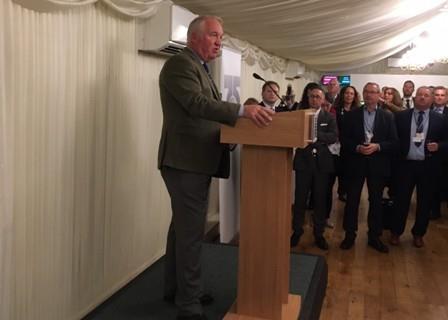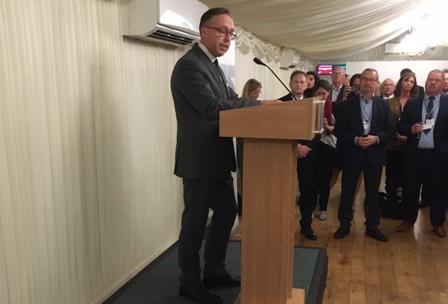
Last night the RHA held its annual parliamentary reception at the House of Commons, just days before the UK is due to leave the EU and one year since Sir Mike Penning MP (above) announced he was forming a new all-party parliamentary group (APPG) on road freight and logistics.
At the time Sir Mike set three goals for the first year of the APPG: “Without a doubt, address the issue of the driver shortages, because that's addressable. We're capable of doing that, that's not one of these impossible things that we're dreaming about. And second to improve the reputation of the haulage and logistics industry in the eyes of the general public. And third, to get government to really understand just how bloody important this industry is.”
The APPG has just delivered a report on the labour shortage facing logistics, which it puts at 60,000 workers, to the government, setting out seven key recommendations for action by various departments:
• Significantly improve the Driver CPC so young people receive worthwhile training and see a clear career path as a professional driver
• Make physical and mental well-being a mandatory part of the Driver CPC as drivers are both sedentary and isolated, putting them at high risk
• Review parking facilities to provide drivers with basic sanitation and safety
• Better promote the value of the industry and communicate the range of apprenticeships and career opportunities to school leavers and the public
• Reform the Apprenticeship Levy because funding available is not enough to cover the cost of training and the standards approved are not what the industry most demands. The industry has contributed £280m in levy payments and only drawn down £20m since April 2017
• Better signpost support military leavers and support their transition into careers in logistics as they are a highly skilled and chronically under-utilised labour pool
• Add HGV drivers and warehouse operatives to the Shortage Occupation list as 80% of the workforce earns less than the threshold of £30,000 and their absence gives the perception that the government does not value their critical role in keeping Britain moving
Addressing the reception Sir Mike reminded MPs and RHA members that he pledged he would walk away from the APPG if it became no more than a talking shop.
“It hasn’t,” he said. “It has actually made a difference. The report that has gone in today means that government knows exactly what our concerns are and where we are coming from. There is a lot more to do, not just around the shortage of drivers. This country has trained 20% of the armed forces who leave every year in HGV driving. The percentage of women drivers in the Army is 20% - why are they not coming into the industry? Partly because we are not offering the sort of career prospects, the roadside facilities and all the things we need in the 21st century.
“We are not short of drivers. There are nearly twice as many licences held than the number of drivers we are short of. As well as training more drivers we need to encourage people to stay and give them a career within this industry.”
Sir Mike added that the report was only one step on the APPG’s path.
“For me, the industry needed a voice in parliament and the government needed to listen,” he said. “We have started on that journey. It has taken us a year and we have more work to do.”

RHA chief executive Richard Burnett (right) paid tribute to the work of the APPG led by Sir Mike. “He certainly sees the importance of our industry, of keeping the UK economy moving and of tackling the many issues that we face,” he said. “I would also like to thank Grant Schapps [appointed transport secretary in 2019 by PM Boris Johnson, replacing Chris Grayling] for his support. Dealing with Grant has been like a breath of fresh air.”
The skills shortage is inextricably linked with Brexit, as many EU logistics workers especially eastern Europeans have been leaving the UK since the 2016 Brexit vote and the subsequent fall in the value of sterling.
Burnett castigated the government for the prolonged period of uncertainty while it struggles to deliver Brexit.
“Brexit has been an enormous challenge and drain for all of us,” he said, “but particularly for our industry as we prepare for the possibility of a no-deal Brexit. This focus has been driving paralysis across government when there are so many issues not being addressed. It is affecting the economy, with profit warnings left, right and centre and high street shops disappearing.
“The transport and logistics sector is a great barometer of the UK economy. When volumes drop it is a sign of a slowing economy and having spoken to many members it is clear volumes are flat or falling.
“We need to stop this paralysis and get Brexit done. We are fed up as a nation and as an industry of having to constantly deal with the potential of a no deal. We need clarity and surety to invest and drive growth again and our customers need exactly the same.”
Burnett also attacked the Apprentice Levy as a “tax on business”.
“The last set of numbers suggest we have paid £280m into the Levy and only drawn down £20m,” he said. “An industry delegation today went to Downing Street to deliver a letter to the prime minister calling on the Department for Education to reform the Levy which simply isn’t working for our industry.”
The RHA and Microlise director Bob Harbey launched Road to Logistics in 2016, a “national training programme to encourage new talent into the transport and logistics industry from sections of society where individuals need help and support”, which is helping ex-offenders and former military personnel make the transition into civilian HGV driving careers. The government recently made a £1m grant to the scheme to help it make the transition from a pilot to a national programme and put a real dent in the driver shortage.
“I would like to thank Grant Schapps for supporting Road to Logistics with that £1m kick-start to fund this significant pilot,” said Burnett. “It is a not-for-profit organisation created by the RHA and Microlise to give ex-offenders, veterans and the long-term unemployed the training they need to be HGV drivers, giving them a future and some self-respect back while solving the driver shortage.”
Sir Mike, himself a former Army HGV driver, echoed Burnett’s praise for Schapps’ support for Road to Logistics.
“Some people do go off the rails, sadly quite a few of those are ex-armed forces,” he said. “One minute they are heroes, the next they are villains and are in prison. Service leavers are disproportionately represented in our criminal justice system often only a few months after they leave the armed forces – men and women. We need to give them a second chance.”













